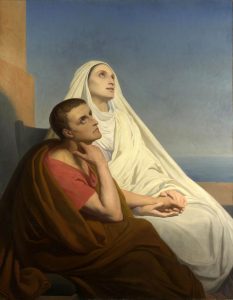- 1 Thessalonians
- Responsorial Psalm 97:1,2,5-6, 10-12
- Matthew 23:23-26
Aside from our love and devotion to the Blessed Mother Mary, one mother who prayed fervently for her child was St. Monica, the mother of St. Augustine. She lived in North Africa, in the region known today as Algeria. Monica was married to Patricius, a pagan, who later converted to Christianity before his death.
They had three children: Navigius, a good and obedient son; Perpetua, their only daughter, who entered a convent and eventually became an abbess; and Aurelius Augustine. Augustine, unlike his siblings, was different—at a young age, he was heavily influenced by his worldly and wayward peers. While studying in Carthage, he took a mistress and even told her it would not be a problem for her to give up her Christian faith.
In desperation, Monica sought advice from a bishop, who encouraged her to be patient and persistent. For years, she wept, fasted, and prayed unceasingly for Augustine’s conversion.
Eventually, Augustine went to Milan, where he heard the powerful preaching of Bishop Ambrose. By God’s grace, the seeds of faith were sown. It became clear that Monica’s prayers were finally being answered.
In his Confessions, Augustine described telling his mother that his struggle had ended. She leapt for joy, understanding that God had given her more than she had ever asked. Augustine was baptized by Bishop Ambrose in Milan in April of 387.
On their way back to North Africa, while waiting in Ostia to board a ship, Monica said to Augustine:”I have no further delight in anything in this life… There was only one reason I wished to linger a little longer in this world—to see you a Catholic Christian before I died… Why am I still here? Bury me wherever you wish, but remember: my one desire is for us to be together at the altar of the Lord.” Five days later, Monica caught a fever, fell into a coma, and died.
Augustine devotes many passages of his Confessions to his mother, acknowledging all he owed her.
The Gospel we just heard is, in a sense, a crisis: “Woe to the Pharisees, woe to you, and—especially—woe to me.” The word woe expresses deep sorrow, frustration, and disappointment. Jesus is voicing his discontent. Our world is filled with real woes, but also with woes of our own making. Just observe what’s happening around us.
Brothers and sisters, this is the real human experience.
We struggle with all kinds of messes—some we understand, others we don’t. We fail to meet expectations—of what a good person, or a good priest, should be. We falter again and again—sometimes publicly, sometimes privately, in the hidden struggles of our hearts.
We are broken, foul, and at times ill-mannered—some of us may look fine on the outside but are hurting within.
We are often impatient, precise to a fault, and claim to understand others, though we rarely do—caught up in our own problems and worries.
This is why Tagbadbad Foundation Inc., in collaboration with the Santo Niño Spirituality Center, welcomes the Midlife Integration Program—to help us manage ourselves in a balanced, integrated way, and reassess our lives for new opportunities for growth.
Yes, there are woes—
In us, in the world, even in the lives of the saints. St. Monica certainly had her share of woes. She was, after all, the mother of a wayward son who was later converted.
We are richly blessed by the benevolence of God. Through His grace, there is healing. We have our community—the Church—to dispense the sacraments and to offer us hope.
In the midst of sin, division, pain, and conflict, we have HOPE.
All the saints were sinners. But they knew how to deal with their woes! So, let us take up the mantle of kindness, pastoral concern, and love—the mantle of Jesus.
Can we set aside our self-righteousness and intellectual pride to become attentive listeners of God’s voice?
This is an ongoing process. Let us be transformed—from sinners into saints—because we have learned to let go, to love, to sacrifice, and to practice what we preach.
As St. Augustine once said: “It was pride that changed angels into devils; it is humility that makes men angels.”
St. Monica, pray for us.
Fr. Arlon, OSA

